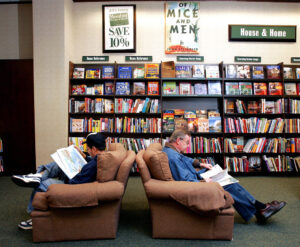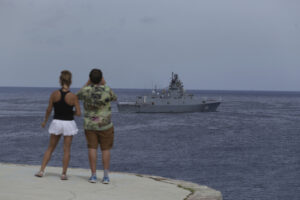Navigating the 90s Legacy: Baltic States, EU, and Russia’s Challenges
The concerns (and hopes) of the Baltic trio were primarily focused on their role within this “new” Europe. The 1990s were a defining period for the Baltic states, symbolizing their return to the free world and bringing forth a multitude of political opportunities that had once seemed distant dreams, including EU and NATO membership.

Image Credit: Warsaw Institute
In a recent interview with DW News, Latvian Minister of Foreign Affairs and President-elect Edgars Rinkēvičs, in response to the claim that the rest of the world should have listened more diligently to the Baltic states (Estonia, Latvia, and Lithuania) warnings about Russia’s imperial ambitions, wittily asserted that perhaps “we all lived in the 1990s for too long.” Two elements of his statement remain unclear. First, who is the Latvian Minister and President-elect referring to as “we” – is it the EU, the Baltic states, or another group altogether? Secondly, and largely dependent on the previous consideration, what exactly is his conception of the 90s, and how can it shed light on the failure to prevent the Russian government’s territorial aggression in the past decade?
The 90s encapsulated a myriad of collective expectations, envisioning an end of armed conflict, the widespread adoption of liberal democracy, and the fortification of multilateral institutions – a vision fitly captured by Francis Fukuyama’s famous proclamation of “the triumph…of the Western idea.” During this time, the EU assumed the role of a normative power, shaped by its unique “historical context, hybrid polity, and political-legal constitution.” This distinctive position endowed the EU with the authority to determine what constituted “normal” on the European continent. This authority was reinforced by the widely-held assumption that the EU’s ideological appeal was universal and would ultimately be the source of convergence among all European states, potentially even extending to Russia.
In the European context, the process of institutionalization took on an unprecedentedly “reflexive” nature, driven by the “devaluation” of military power. Instead, the focus shifted toward questions of economic capacities and commercial competitiveness. While cooperation in military affairs was often regarded as undesirable, due to the high costs and risk associated with defection, collaboration in the economic realm was believed to boost national welfare. Therefore, a rise in the prominence of economic matters went hand in hand with the growth of multilateral institutions, which were designed to “coordinate relations among three or more states on the basis of ‘generalized’ principles.” These transformations indicated an impending era of change for the European continent. European states, as they communicated through the 1990 OSCE Charter, anticipated the emergence of a “new” Europe.
The concerns (and hopes) of the Baltic trio were primarily focused on their role within this “new” Europe. The 1990s were a defining period for the Baltic states, symbolizing their return to the free world and bringing forth a multitude of political opportunities that had once seemed distant dreams, including EU and NATO membership. Liberated from the political shackles of the Soviet Union, the Baltic states were guided by “cultural politicians,” such as ex-film director and writer Lennart Merithe and professor of musicology Vytautas Landsbergis, who embarked on a “Westernizing” mission of state and civil society building. There was an optimistic belief that Russia might eventually embrace similar changes. After all, the Baltic people witnessed how thousands took to the streets of Moscow to protest against the use of Russian forces in Lithuania. Some scholars even suggested, what now seems like a dystopian fantasy, that the Baltic states could form a security community with Russia as an alternative to the EU.
Nevertheless, the unwavering optimism about the future that characterized the 90s, embraced by both the EU and the Baltic states, as Edgar Rinkēvičs implies, was soon discovered to be based on a number of flawed assumptions. The EU failed to consider that its normative appeal did “not extend much further East than Ukraine,” leaving it with little of either a carrot or a stick when dealing with the “rest” of Europe, as it had completely distanced itself from the use of hard power. The vision of a unified European home that encompassed Russia, alongside the hopes for its democratization, proved incompatible with the domestic developments taking place in Russia throughout the decade.
These developments included the First Chechen War, the failure to prevent the majority of the former communist elite from retaining their influence within political structures, and the prevalence of far-right and imperialist rhetoric. Observers also witnessed a shift in Russia’s internal debates toward a romantic nationalist stance. This perspective emphasized a perceived “civilizational” divide between the West and Russia, prioritizing confrontation over cooperation as a fundamental element of Russia’s foreign policy. Over time, Putin’s regime adopted this stance, reinforcing it with a Soviet-type institutional framework. Consequently, the expectations for Russia to reintegrate into the Western world gradually waned.
Liberalism, despite its initial promise, has faced an ongoing struggle against the rising tide of illiberalism, which has been gaining strength by appealing to the notions of a strong nation, family, and tradition. Compounding this challenge, faith in liberal democracy has begun to dwindle even amongst its traditional champions, including the United States and EU members. A series of crises, starting with the great recession, followed by the refugee crisis, and now the Covid pandemic, have left many disillusioned about the effectiveness and power of liberalism. Inevitably, this erosion of confidence has significantly undermined the adaptive nature and resilience of multilateral institutions.
The Baltic states have come to learn that mere participation in such institutions did not always translate to an equal, or even valued, voice in European affairs, which explains why their concerns about Russia were seemingly ignored. This is exemplified by the fact that an EU diplomat implied that Estonia is not a “real” country when questioned by an Estonian representative regarding their country’s deviation from OSCE citizenship policies. This incident highlighted the profound orientalist tendencies inherent in Western perceptions of Eastern Europe, the origin and history of which have been meticulously documented by American historian Larry Wolff.
The optimistic aspirations that emerged at the turn of the 20th century soon turned into harrowing nightmares, such as the war in Kosovo, the rise of populism across Europe, and Russia’s partial and then full-scale invasion of Ukraine. By referring to the 90s, the Latvian President-elect is suggesting that both the EU and the Baltic states had been convinced, perhaps naively, that Europe’s future would not resemble its past. A past of war and center-periphery divides. The next two decades proved, rather unequivocally, that their conviction was premature.




